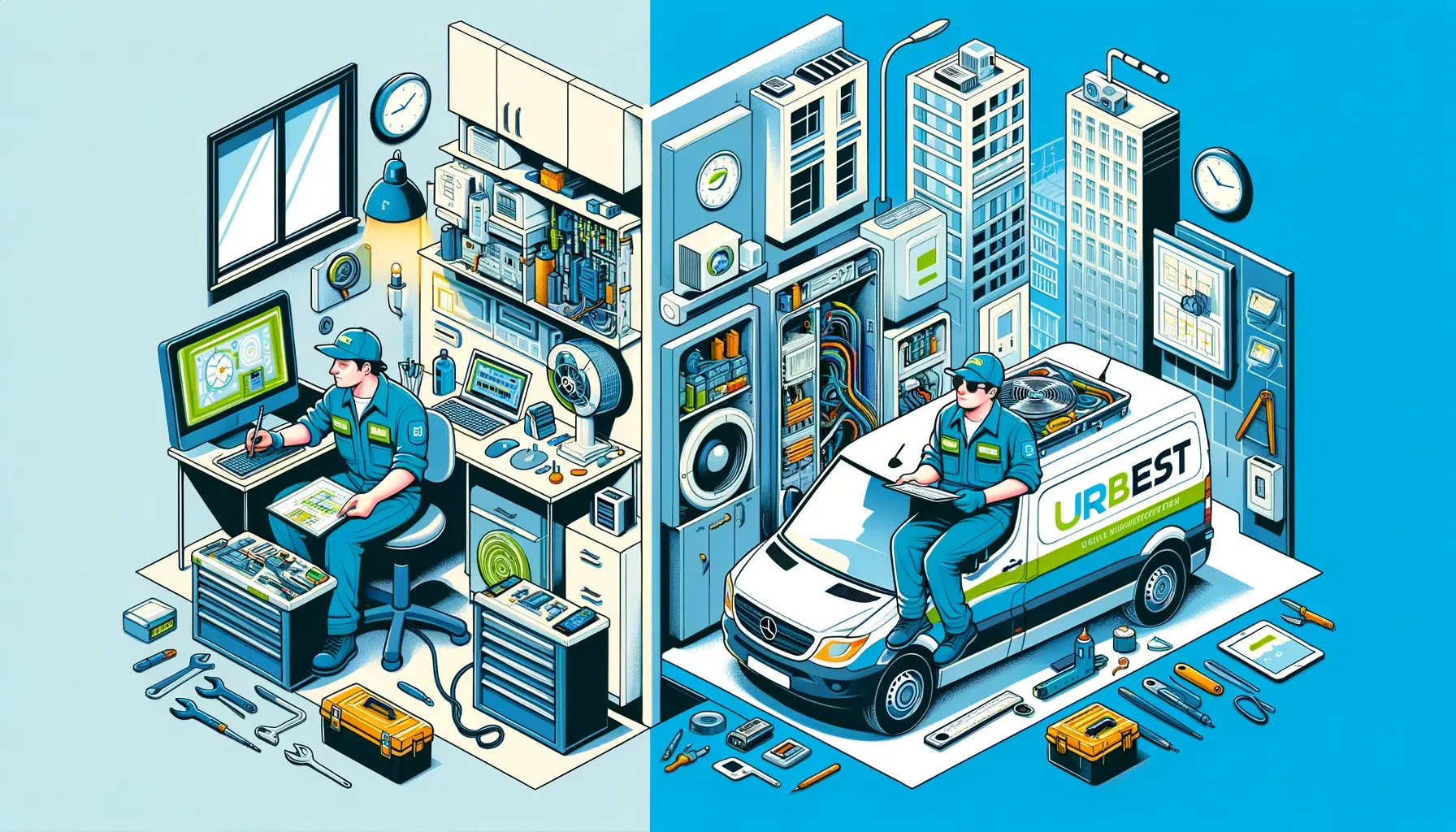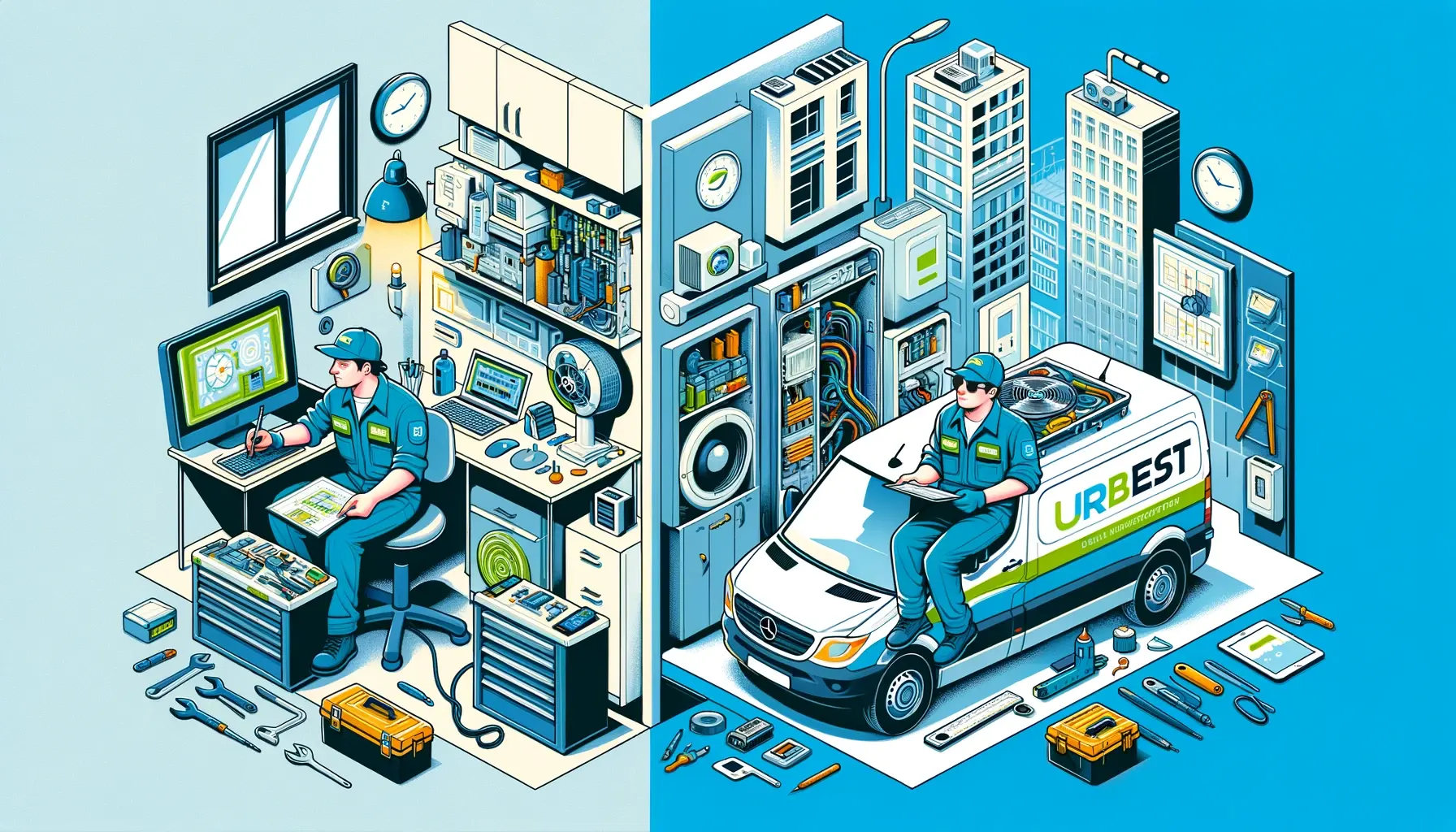Mechanical engineer, Electrical engineer, Field service engineer, Maintenance engineer: Everything You Need to Know
Everything you need to know about being a maintenance technician: advice and tips for career progression.

This article discusses the market in which maintenance engineers operate, the key stakeholders, and the skills needed to succeed and advance.
The Market of facility management
1.1 In-House or Outsourced facility management
The potential market for Facility Management (FM) technicians includes:
- Real estate and public agencies
- External service providers
1.1.1. In-House
An in-house agency in facility management refers to a dedicated team or department within an organization responsible for managing and overseeing all aspects of the organization's facilities. Many large corporations, universities, and healthcare institutions have in-house facility management teams to manage their extensive and complex facilities. Specifically for maintenance, there are two types of in-house agencies:
- (i) Real estate: A company or service responsible for managing real estate properties, including leasing, maintenance, and sometimes sales.
- (ii) Municipal or public: A public service directly managed by a local community (such as a city hall) to operate certain local public services, such as water, transport, waste, maintenance, etc. These agencies are characterized by providing local service, knowing users well, and delivering good quality profit without seeking to maximize profits, all influenced by local public policies.

1.1.2. Outsourcing (Service Providers) Outsourcing facility management services is the process by which a company or organization delegates the management and execution of certain tasks and services related to the operation and maintenance of its facilities to an external specialized provider. The most commonly outsourced services are:
- Building maintenance: Repairs, preventive and corrective maintenance, heating, ventilation, and air conditioning (HVAC) systems management.
- Cleaning services: Daily cleaning, specialized cleaning (windows, carpets), waste management.
- Security management: Monitoring, access control, fire safety.
- Landscaping management: Garden maintenance, green spaces, and parking areas.
- Catering services: Reception management, mail services, meeting room management.
- Energy management: Monitoring and optimizing energy consumption, managing energy supply contracts.
- IT infrastructure management: Technical support, network and equipment management.
There is no one-size-fits-all solution for outsourcing, and the reasons for switching from an in-house to external providers can vary: financial reasons, service improvement goals, risk transfer, workplace transformation, environmental impact improvement.
The benefits organizations derive from outsourcing include:
- Cost reduction: Decreased spending on personnel, equipment, and training.
- Access to expertise: Utilizing the skills and experience of a specialized provider.
- Performance improvement: Providers often motivated by performance-based contracts with service level agreements (SLAs).
- Risk management: Transfer of some operational risks to the external provider.
1.2 Site-Based vs. Mobile worker
Choosing a career also involves choosing a workplace. In maintenance, it can vary significantly whether one opts for a fixed site-based position or mobile work traveling from building to building. A "site-based" technician refers to a property where management and maintenance services are provided by permanently stationed staff. This means a constant presence of employees on site to proactively address daily needs. A site-based setting is distinguished by a deep knowledge of the site, which usually allows for personalized services. A "mobile technician" is responsible for maintenance in multiple buildings or sites. Unlike a site-based technician, the mobile technician travels from one site to another for scheduled, emergency or inspection. Their strengths lie in mobility, flexibility, responsiveness, and versatility.

1.3 Client Typology in facility management
An engineer can work in very different environment depending on the sector chosen. Each of them have some specificity and expectations from building users:
- Schools (types of facilities, multi skills required for agents)
- Shopping centers (importance of exterior appearance and comfort)
- Offices (responsiveness of occupant services, HVAC management, optimizing flows according to peak hours)
- Health facilities (critical nature of equipment operation, multi-site management)
- Residential (social housing, condominiums, service residences, co-living spaces)

Key Stakeholders in contact with a maintenance engineer:
Property manager can have various titles: Property Manager, Site Manager, Director of Site, Director of operation, Bursar or Director of Establishment.
Multiple Service providers are in touch with a maintenance engineer:
- Security agents
- Cleaning staff
- Reception and front desk
- Catering teams
- Building occupants, also called residents, sometimes employees or tenant representatives if they are unique representatives for a group of people
- Property owner representatives (or Asset Managers), more rarely

The goals of these stakeholders are quite different, and it is crucial to understand the stakes of each to perform well as a technician and provide the best service to these individuals.
2.1 Property Manager are responsible for ensuring efficient operation and maintenance of a building.
Property managers topics of interest are twofold:
- Administrative and rental issues: Are the spaces well-occupied or rented? Do I need to be proactive in finding a new tenant? Are rents properly billed and collected? Are my tenants/occupants satisfied with the spaces they occupy?
- Technical and facility management issues: In this area, the manager works closely with technical operators (internal or external) to monitor the cost of maintenance, energy, and services expenses. The manager must ensure that the buildings under management do not lose value i.e. equipment or facade getting destroyed or out of order. In this regard, the property manager will focus on the good execution of preventive maintenance. The manager is also interested in monitoring energy consumption to anticipate deviations and prevent bills from increasing, which would reduce the profitability of a rented building or lead to budget overruns for a public establishment.
Moreover, they must ensure that the quality of service is good for interactions or requests from building occupants. For this, they generally monitor the number of requests made by occupants, and the resolution time to ensure that the delays are acceptable. This may sometimes be supplemented with satisfaction surveys. In summary, the technician can assist the manager in three dimensions:
- Managing operating costs (energy and corrective maintenance)
- Preserving the quality of the building (work and preventive maintenance)
- Responsiveness and services rendered to occupants
A good technician must therefore be able to communicate and produce information on these three areas so that the manager and ultimately the property owner can have an idea of the real estate value and the satisfaction of the occupants.
The property manager's reporting includes:
- Energy consumption
- Rents collected and vacancy rates of spaces
- Occupant requests: number, satisfaction, and resolution time
- Tracking the percentage of preventive maintenance completed
- Upcoming or overdue regulatory controls
- Reviewing quotes to be validated
- Other indicators: waste production, circular economy, social impact
As a technician, it is important to keep these objectives in mind to facilitate the flow of information and decision-making for a manager. The more fluidly information flows from the field to managers or property representatives, the more day-to-day decisions and operations will be facilitated, with quotes being validated more quickly, emergencies being anticipated and therefore avoided, improved occupant satisfaction, and ultimately more pleasant working conditions for everyone.
Skills to Have as a facility manager
3.1 Technical skills to have for a facility manager
A maintenance technician must have solid knowledge of mechanics, electricity, and electronics to diagnose and repair faulty equipment. Mastery of diagnostic tools and testing equipment is essential for quick fault identification. They must also be able to read and interpret plans, diagrams, and technical manuals to understand system operations and repair procedures. Skills in programming and automation may be necessary, especially for modern equipment controlled by computer systems. Additionally, skills in welding, plumbing, and HVAC (heating, ventilation, and air conditioning) may be required, depending on the industry.
3.2 Being comfortable with Data and Technology as a facility manager
The role of digital and information technologies is key to standing out. Even today, 9 out of 10 people admit they struggle to produce reliable data on what is happening in operations: gathering technical data, number of requests by nature, expected processing time, consumption by area… Being comfortable with data management and technology involves a combination of technical and analytical skills, as well as an ability to learn and adapt to new technologies. This includes:
- Computer skills: Knowing how to use computers, operating systems, and various software (such as office suites, project management tools, communication platforms, etc.).
- Data handling: Being able to collect, produce, organize, store, and manage data effectively. This includes knowledge of databases, spreadsheets, and ideally data management tools.
- Data analysis: Being able to interpret data to draw useful conclusions. This may involve using data analysis software, understanding basic statistics, and the ability to visualize data for easier comprehension.
- Use of specialized software: Being comfortable with software specific to a particular field, such as collaborative applications like Urbest.io (CRM), GTB systems, or energy management systems.
- Adaptability to new technologies: Being open to learning and adopting new technologies.
- Data security: Understanding the basics of computer security to protect sensitive data against cyber attacks.
It is therefore important to keep in mind that every 5-10 years, significant changes will occur in our way of working, and accepting that one will regularly need to change and update their method of work. To get started, Urbest offers a freemium version to get familiar with a collaborative tool for real estate management. Here is the link for a free demo.
3.3 Communication with building stakeholders
The better one can communicate what is happening on the ground, the more one can discuss with decision-makers to influence what happens with an asset or building. It is therefore important to share and communicate field findings using data or exchanges with people in a building. A decision-maker is interested in rent levels, investments, new tenants, and new services to implement. Any information that refines their understanding of what is happening in a building will be invaluable for them in making the right investment decisions, setting rent levels, and searching for tenants.
3.4 Organizational Skills for facility management
Organizing oneself, organizing interactions within a team, and organizing exchanges with external stakeholders are essential skills for effective management. First, personal organization involves time management, task prioritization, and maintaining a clear schedule to avoid delays. This also requires good mastery of task management tools and the ability to stay focused and disciplined.
Next, organizing team interactions means fostering clear and regular communication among members, defining precise roles and responsibilities, and setting up processes to track project progress. This can include using online collaboration platforms, holding regular meetings, and creating shared documents to ensure everyone is aligned on common goals.
Lastly, organizing exchanges with external stakeholders requires coordination to manage expectations and deadlines. It is important to maintain open and transparent communication channels, document interactions, and notify others in case of any particular event. This also includes managing contracts, overseeing deliverables, and proactively resolving issues. Being aware of what is happening and the work to be done involves constant vigilance and the ability to anticipate future needs. Knowing who is authorized to do what and for what purpose is crucial to avoid conflicts. This understanding allows for effective task delegation, compliance with permissions, and maintaining a structured and functional organization. In terms of skills, this consists of:
- Time and priority management: Ability to manage one's schedule, prioritize tasks, and maintain a clear calendar.
- Clear and regular communication: Ability to facilitate transparent and regular interactions within the team.
- Definition and tracking of roles and responsibilities: Knowing how to assign specific roles and track the progress of tasks and projects.
- Coordination and management of external expectations: Skill in managing interactions with external partners.
- Vigilance and anticipation of needs: Being constantly aware of developments and future needs, and understanding permissions and objectives for effective delegation.
Promising Sectors for facility managers
The following sectors and professions are experiencing strong growth and offer attractive prospects for advancement in terms of compensation and responsibilities for technicians looking to advance.
4.1 Coliving
Coliving, a more structured and large-scale type of shared housing, has been developing since 2015. The smallest co-livings include about ten places, while the largest in the United States can have up to 400 places. Often, co-livings have a theme or trademark that relates to the type of tenants they wish to attract: intergenerational, students, young professionals, single parents, etc. A young technician starting in a small co-living group can grow and expand their expertise as the co-living company opens new sites. This offers opportunities for construction/renovation projects, addressing reservations, structuring a maintenance team, and procuring contracts for energy, maintenance, and equipment. See an example with the co-living at La Casa.
4.2 Private Education Group
Private educational groups are seeing an increasing number of students from primary to high school as well as higher education campuses. This results in the opening of new sites with construction to supervise and new sites to maintain. Ideal for starting a career in a school group planning to expand.
4.3 Technical Consulting
After a few years of experience in multi-technical maintenance, it may be worthwhile to offer your services as an independent consultant to real estate managers or owners to solve specific technical problems. This assumes having some experience and allows you to value your expertise on specific technical issues, thus more lucrative.
4.4 Building Managers
New positions for building managers, which would previously have been considered as janitorial roles and now require increasingly technical skills, are also interesting for gaining influence. If by nature, you enjoy interacting with people and technology, this position is for you. This requires the ability to coordinate service providers and communicate well with owners and occupants.
If you are starting a new position and would like a test access to Urbest to begin structuring your work method, this is entirely possible and you can contact Hugo Gervais by email at hugo@urbest.io or directly on the website.
